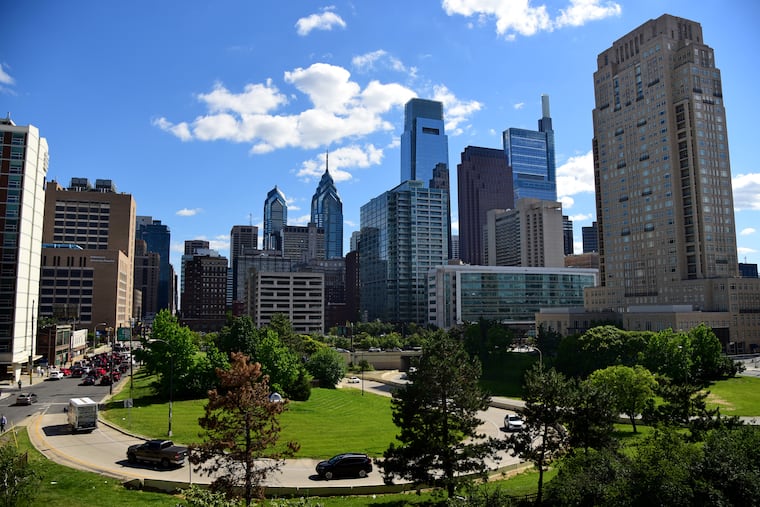Philly judge orders city and schools to repay nearly $50 million in tax revenue to commercial property owners
Judge Gene Cohen said the city illegally targeted commercial properties due to "political pressure" to increase revenue.

Ruling in one of the largest assessment challenges in Philadelphia’s history, a judge on Thursday ordered the city and School District to repay commercial property owners nearly $50 million, after finding that their properties were unconstitutionally targeted for revaluation due to “political pressure” to boost revenue.
Senior Common Pleas Court Judge Gene Cohen said the city and district must repay the money collected in 2018 taxes to the owners of about 700 of the city’s most prominent and valuable office complexes, apartment buildings, and hotels — including One Liberty Place, Centre Square, and the Bellevue Hotel.
The reassessment was illegal, Cohen ruled, because commercial properties were revalued while residential assessments were left largely intact.
“The desire and demand of City Council for revenue from a targeted reassessment of commercial properties was a substantial motivating factor,” he wrote.
Cohen’s ruling nullified the 2018 assessments for the properties involved in the case and ordered that the city refund the difference between their 2017 and 2018 taxes. He set a refund deadline of July 2021.
That amount includes property and use-and-occupancy taxes and totals up to $48 million, city spokesperson Mike Dunn said Thursday — excluding interest, which the judge also ordered the city to pay. Of that amount, $14 million would come from city real estate tax revenue and $34 million would be School District revenue from both real estate and use-and-occupancy taxes.
The city is “very likely to appeal” the ruling, Dunn said in an email Thursday. Lawyers for the city and district had argued during trial last month that repaying the taxes would harm their budgets. The district would likely have to make reductions in personnel, they said. Neither the city nor the district had set aside money for potential refunds.
Megan Lello, a spokesperson for the School District, said losing $34 million would have a “significant impact.”
“The most unfortunate part is that the ruling could jeopardize the hard-won progress the district has made over the last three years to improve academic outcomes for the children of Philadelphia,” Lello said. "They deserve better than this.”
Thursday’s ruling also delivered a blow to the Office of Property Assessment as it faces ongoing scrutiny from property owners and City Council members — especially for its 2019 and 2020 revaluation projects that led to substantial assessment increases and tax hikes for thousands of homeowners.
City Council President Darrell L. Clarke, who has been critical of the city’s assessment practices and called for new leadership of OPA, said Thursday that he would support the city’s plans to appeal the ruling.
“The taxes generated by these commercial property assessments generate millions of dollars in revenues not just for the city, but for the School District of Philadelphia as well," Clarke said in a statement. "Our schools need every dollar available to educate and support our children.”
» READ MORE: What can Philly’s elected officials actually do about your property taxes?
After presiding over an eight-day trial in June, Cohen agreed with the property owners that the 2018 reassessment — which resulted in about $118 million in additional revenue for the city and School District — amounted to illegal targeting of a group of properties. The city violated the so-called uniformity clause in the state constitution, which requires equal treatment for all types of properties, Cohen said.
In his ruling, Cohen cited statements from City Council members, who encouraged Finance Director Rob Dubow to revalue commercial properties.
“There is ample evidence of such political pressure,” the judge wrote.
City Councilman Allan Domb, whom Cohen noted had applied political pressure by asking Dubow to complete the commercial property reassessment, said commercial assessments had been too low relative to residential values.
“The facts are, the property assessments were not accurate resulting in less revenues for our schools,” Domb said in a statement Thursday.
Glenn Weiner, an attorney for Klehr Harrison Harvey Branzburg LLP, which represented about 150 properties involved in the case, said the ruling “merely requires the city to comply with the Pennsylvania Constitution.”
But the city maintained Thursday that the commercial property owners were simply trying to get out of paying higher taxes.
“They are contesting the city’s right to revalue their grossly undervalued high-end properties,” Dunn said. “In other words, plaintiffs are essentially trying to leverage the Pennsylvania Constitution to claw back their fair share of 2018 taxes that they have long since paid.”
City officials had previously said $63 million was at stake in the case, but Dunn said Thursday that the number of properties involved has changed and not all of them pay the use and occupancy tax, which goes to the School District.
The ruling impacts only the properties’ 2018 assessments; their assigned market values and taxes for 2019 and 2020 will remain in place.
Peter Kelsen, a lawyer for Blank Rome, which represented about 300 property owners in the case, said he was pleased with Cohen’s ruling.
“I believe what this decision will do is make it clear to the city and give guidance to taxpayers … whether they’re residential or commercial, that constitutional requirements have to be followed to the letter of the law in order to have a legal and fair tax assessment process,” Kelsen said.